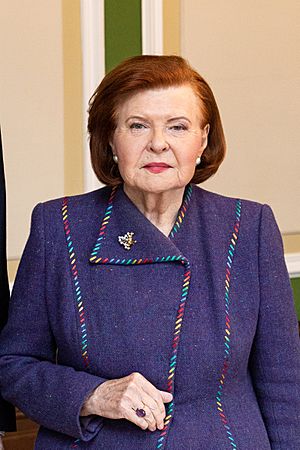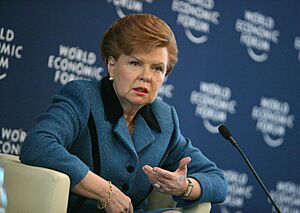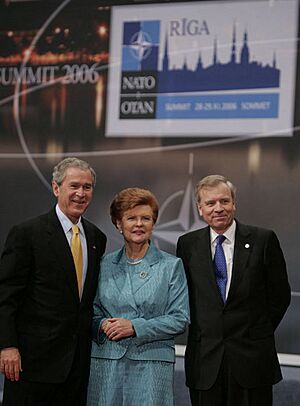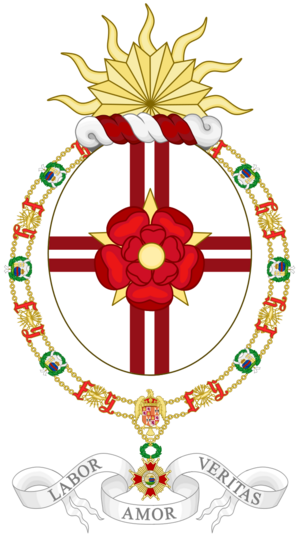Vaira Vīķe-Freiberga facts for kids
Quick facts for kids
Vaira Vīķe-Freiberga
|
|
|---|---|

Vike-Freiberga in 2022
|
|
| 6th President of Latvia | |
| In office 8 July 1999 – 8 July 2007 |
|
| Prime Minister | Vilis Krištopans Andris Šķēle Andris Bērziņš Einars Repše Indulis Emsis Aigars Kalvītis |
| Preceded by | Guntis Ulmanis |
| Succeeded by | Valdis Zatlers |
| Personal details | |
| Born |
Vaira Vīķe
1 December 1937 Riga, Latvia |
| Political party | Independent |
| Spouse |
Imants Freibergs
(m. 1960) |
| Children | 2 |
| Alma mater | University of Toronto McGill University |
| Signature | |
Vaira Vīķe-Freiberga (born 1 December 1937) is a famous Latvian politician. She was the sixth president of Latvia from 1999 to 2007. She is the first and only woman to have held this important job in Latvia. She was also the most recent president to be chosen for a second term.
Before becoming president, Vaira Vīķe-Freiberga was a professor and a smart scholar. She wrote many books and articles. As President, she helped Latvia join the European Union and NATO. These are big groups that help countries work together. She also worked in international politics. In 2006, she was even a candidate to become the Secretary-General of the United Nations.
She still works to support freedom, fairness, and social justice around the world. She is known for her work on how language affects our minds (psycholinguistics) and for studying Latvian folk songs.
After her time as president, Vīķe-Freiberga helped start the Nizami Ganjavi International Center. She also led the Club of Madrid, which is a group of former world leaders.
Contents
Early Life and Education
Vaira Vīķe was born in Riga, Latvia. In 1944, when Latvia was occupied by the Soviet Union, her family had to leave their home. They went to Germany, where Vaira started primary school in a camp for people who had lost their homes. Sadly, her baby sister died there.
In 1949, her family moved to Casablanca in Morocco, Africa. There, she learned French at a primary school. Later, they moved to Toronto, Canada, in 1954, where she finished high school.
Vaira went to the University of Toronto and earned a degree in psychology in 1958. She also got her master's degree in 1960. She was very good at languages, speaking English, French, Latvian, Spanish, and German. She worked as a translator and a Spanish teacher. In 1965, she earned her PhD in psychology from McGill University.
A Career in Psychology
From 1965 to 1998, Vīķe-Freiberga was a professor at the University of Montreal in Canada. She taught about how medicines affect the mind and how language works. She also studied Latvian folk songs, looking at their meaning and structure. During this time, she wrote many books and articles. She also gave hundreds of speeches in different languages.
Vīķe-Freiberga held important roles in science groups around the world. She received many awards for her work in social sciences. In 1998, she became a professor emerita, which means she retired but kept her title. She then returned to Latvia after 54 years away. She became the director of the new Latvian Institute.
Becoming President of Latvia

Vīķe-Freiberga became the president of Latvia in 1999. Even though she wasn't a candidate at first, the Latvian Parliament (called the Saeima) chose her. She was elected on June 20 and officially started her job on July 8. People in Latvia really liked her, and her approval ratings were very high. In 2003, she was re-elected for a second four-year term.

As president, she used her powers to help Latvia. She played a big part in Latvia joining NATO and the European Union. She often spoke at international events, like to the United States Congress. She also talked about important topics like moral values and democracy. She visited many towns and villages in Latvia to meet people and received thousands of letters from them.
In 2006, the three Baltic States (Latvia, Lithuania, and Estonia) suggested her as a candidate for United Nations Secretary-General.
After the Presidency
After her presidency ended in July 2007, Vīķe-Freiberga continued to be very active. She speaks at many international events. She is a founding member and former president of the Club of Madrid, a group of former world leaders. She is also part of the European Council on Foreign Relations.
She has been involved in many important groups. For example, she was appointed vice-president of a group looking at the future of the European Union. She also became a member of the European Council on Tolerance and Reconciliation. In 2011, she led a group of experts for the European Commission on media freedom.
Awards and Recognition
Vīķe-Freiberga has received many awards and honors from around the world. These include the Golden Plate Award in 2000 and the Hannah Arendt Prize in 2005 for her political ideas. She has been given 37 special awards from different countries and 16 honorary doctorates from universities. She is also a member of several important science academies. In 2013, she received the Knight of Freedom Award.

National Honors
- Latvia: Commander Grand Cross with Chain of the Order of Three Stars (1999)
- Latvia: Grand Cross of the Order of Viesturs (2007)
- Latvia: 1st Class of the Cross of Recognition (2007)
Foreign Honors
- Belgium: Grand Cordon of the Order of Leopold (2007)
- Canada: Honorary Officer of the National Order of Quebec (2006) and the Order of Canada (2024)
- Estonia: Collar of the Order of the Cross of Terra Mariana (2000) and the Order of the White Star (2005)
- Finland: Grand Cross with Collar of the Order of the White Rose of Finland (2001)
- Germany: Grand Cross Special Class of the Order of Merit of the Federal Republic of Germany (2003)
- Italy: Knight Grand Cross with Collar of the Order of Merit of the Italian Republic (2004)
- Japan: Grand Cordon of the Order of the Chrysanthemum (2007)
- Lithuania: Grand Cross of the Order of Vytautas the Great (2001)
- Luxembourg: Grand Cross of the Order of Adolphe of Nassau (2006)
- Poland: Knight of the Order of the White Eagle (2003)
- Portugal: Grand Collar of the Order of Prince Henry (2003)
- Norway: Grand Cross of the Order of St. Olav (2000)
- Spain: Collar of the Order of Isabella the Catholic (2004)
- Sweden: Member of the Royal Order of the Seraphim (2005)
- United Kingdom: Honorary Dame Grand Cross of the Most Honourable Order of the Bath (2006)
Other Awards
- Global Women's Leadership Award (2007)
- Truman-Reagan Medal of Freedom (2011)
- Hans J. Morgenthau Award (2024)
- Rober F. Kennedy Human Rights Award (2024)
- Lifetime of Leadership Award
Other Recognition
Four books have been written about Vīķe-Freiberga in different languages. A documentary film about her, called The Threefold Sun, was released in 2008.
Family Life
Vīķe-Freiberga is married to Imants Freibergs. He was a computer science professor. They met at a Latvian Students Club in Toronto. They have two children, Kārlis and Indra.
Vīķe-Freiberga and her husband started a company called VVF Consulting. It helps public and private groups with advice.
See also
 In Spanish: Vaira Vīķe-Freiberga para niños
In Spanish: Vaira Vīķe-Freiberga para niños
 | Bayard Rustin |
 | Jeannette Carter |
 | Jeremiah A. Brown |

